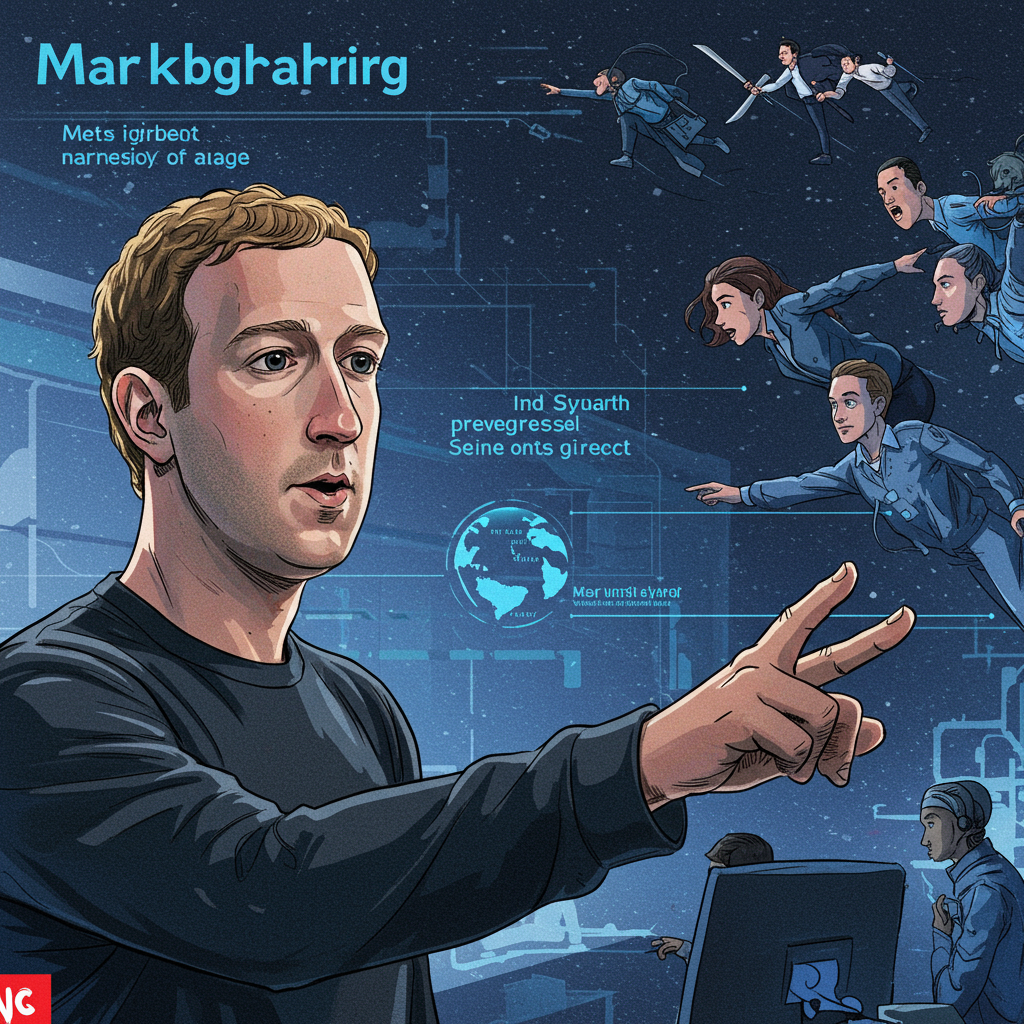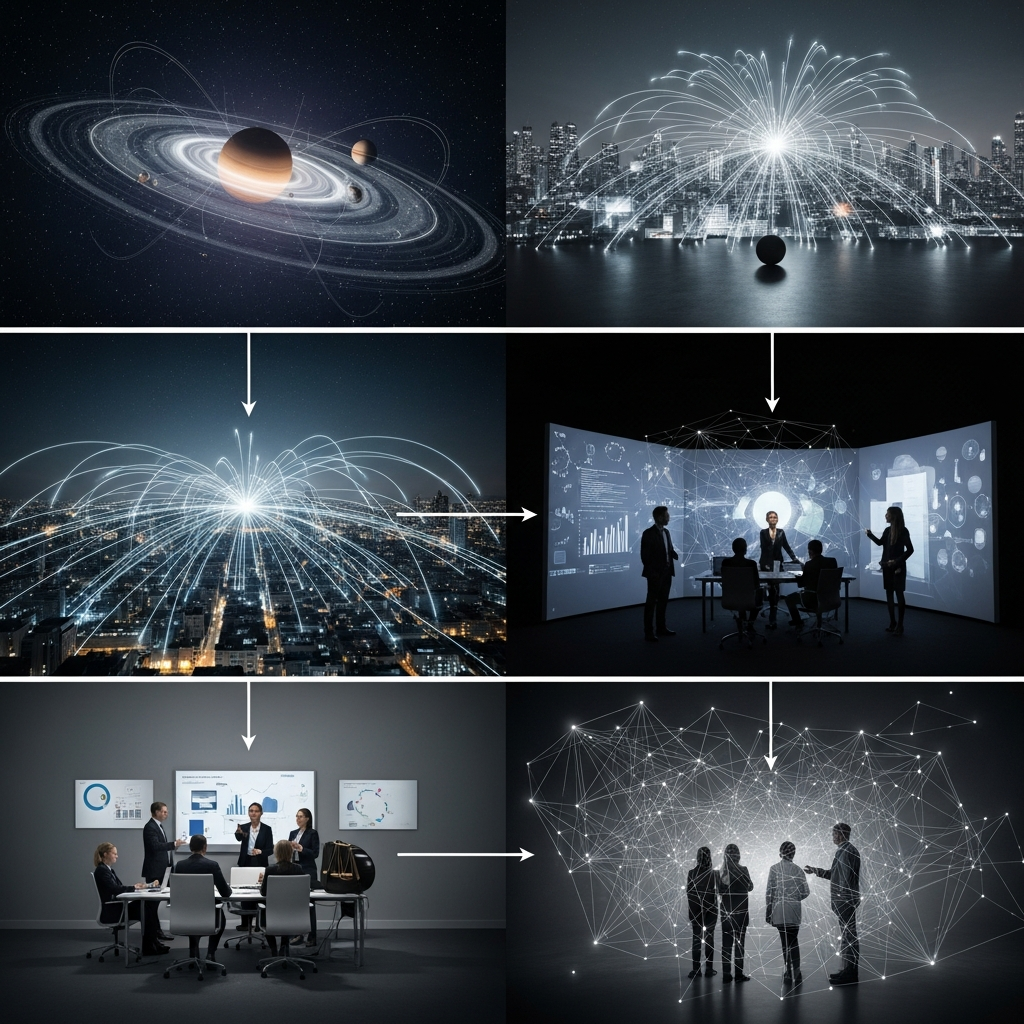Meta Platforms is making a dramatic move in the artificial intelligence race. The tech giant is consolidating its considerable AI resources and aggressively recruiting top talent from rivals. This bold strategy aims squarely at developing advanced AI systems, including those with capabilities potentially reaching what is known as superintelligence. This signifies reportedly-working-on-a-bunch-of-new-xr-devices/” title=”Essential Apple XR Roadmap: Vision & Glasses Future”>meta’s deep commitment and financial muscle in the fierce global competition for AI dominance and the brilliant minds driving it forward.
Forging the Future: Meta Superintelligence Labs Takes Shape
Mark Zuckerberg, Meta’s CEO, recently unveiled a significant restructuring of the company’s AI operations. An internal memo confirmed the creation of a new, unified AI division. This entity is officially named Meta Superintelligence Labs, or MSL. Its formation represents a major consolidation of Meta’s scattered AI initiatives. MSL now encompasses Meta’s long-standing foundational AI research group (FAIR). It also integrates various product teams and other internal AI units.
A crucial component of MSL is a newly established, dedicated laboratory. This lab is purpose-built to focus entirely on developing Meta’s future generations of AI models. Zuckerberg described this undertaking as a pivotal moment for the company. He framed the pursuit of superintelligence as something now “coming into sight.” He even suggested it marks “the beginning of a new era for humanity.” Meta officials have declined further public comment on the internal announcement.
Architects of Ambition: Leading the Charge at MSL
The helm of this ambitious new AI division is held by Alexandr Wang. Wang is widely recognized as the founder and CEO of Scale AI. Meta recently made a substantial strategic investment in Scale AI, reportedly valued at $14.3 billion. Wang has now also taken on the role of Meta’s Chief AI Officer. He oversees the entire Meta Superintelligence Labs organization.
Co-leading the vital new lab focused on creating next-generation models is Nat Friedman. Friedman is another prominent figure within the technology sector. He is best known for his tenure as the former CEO of GitHub. Within the new lab, Friedman will concentrate on the practical side of AI. His focus areas include applied AI research and integrating advancements into Meta’s products. This dual leadership structure is notable. It pairs a leader experienced in data labeling and infrastructure (Wang) with a visionary known for product execution (Friedman). This setup seems designed to bridge cutting-edge theoretical AI breakthroughs with practical, deployable applications efficiently.
Poaching the Titans: Meta’s Aggressive Talent Offensive
The foundation of MSL is being bolstered by an exceptionally aggressive hiring strategy. Meta has embarked on a major global recruitment drive. Their primary targets are securing elite AI researchers from the world’s leading rival firms. The internal memo from Zuckerberg reportedly listed nearly two dozen initial researchers joining the MSL team. Many of these individuals previously held critical positions at competitor companies.
Reports indicate Meta has successfully attracted experts from OpenAI, Google DeepMind, and Anthropic. These new hires represent some of the most sought-after intellects in artificial intelligence globally. They bring diverse and essential expertise to Meta. This includes significant experience in developing sophisticated large language models (LLMs). Their backgrounds also cover breakthroughs in multimodal AI and complex reasoning systems. Additional talent acquisitions include specialists in AI inference optimization and other vital technical domains. The list shared publicly in the memo is reportedly incomplete. It notably did not include employees joining from OpenAI’s Zurich office initially, suggesting even more hires were made from rivals than initially disclosed.
Notable Minds Joining the AI Quest
The internal memo highlighted several key researchers joining MSL and their impressive past contributions. These included individuals who played significant roles in building prominent AI systems at other leading labs. The recruitment effort was reportedly spearheaded personally by Mark Zuckerberg and other senior executives using targeted outreach and even a private WhatsApp group for coordination. One recruit described the effort as a deliberate “transfusion from the country’s top AI labs.”
From OpenAI, Meta hired researchers involved in the development of models like GPT-4o (including voice and image generation), GPT-4, various o-series and mini models (o3, o4-mini, o1-mini, 4.1, 4.5), ChatGPT, and the Operator reasoning stack. Specific names from OpenAI’s Zurich office reportedly joining include Lucas Beyer, Alexander Kolesnikov, and Xiaohua Zhai. Other key OpenAI recruits are said to include Trapit Bansal, Shengjia Zhao, Jiahui Yu, Shuchao Bi, and Hongyu Ren. Jiahui Yu reportedly led OpenAI’s Perception team. Trapit Bansal contributed to OpenAI’s o1 reasoning model and worked on reinforcement learning. This influx covers areas like reinforcement learning, multimodal post-training, synthetic data, and perception expertise.
Researchers from Google DeepMind joining Meta include individuals who were pre-training tech leads for Gemini. Others worked on reasoning for Gemini 2.5, led early LLM efforts like Gopher and Chinchilla, were Google Fellows on projects like Sesame and Maya, or contributed to Gemini’s post-training, coding, and reasoning capabilities. Talent from Waymo’s perception models has also reportedly been acquired by Meta.
From Anthropic, Meta has recruited experts focused on critical areas like AI inference. They bring valuable experience from another major competitor in the AI space. These hires demonstrate Meta’s strategic focus on acquiring talent with direct, hands-on experience in building state-of-the-art AI models and core infrastructure.
High Stakes and Heated Claims: The Talent War Erupts
Meta’s aggressive recruitment campaign unfolded amid an increasingly heated battle for AI expertise. The scarcity of top AI researchers globally has created intense competition among leading tech firms. Reports quickly surfaced claiming extraordinary compensation packages were being offered to these key hires. Figures like eight-figure deals became common, and some reports even mentioned “$100 million signing bonuses” circulated in the media, often attributed to rivals or anonymous sources.
However, some of the new hires publicly disputed the most extreme claims. Lucas Beyer, a former OpenAI researcher who joined Meta, explicitly dismissed reports of $100 million bonuses as “fake news” on social media platform X. Meta’s Chief Technology Officer, Andrew Bosworth, also addressed the controversy during an internal meeting. Bosworth reportedly accused OpenAI CEO Sam Altman of dishonesty. He suggested Altman was simultaneously trying to counter Meta’s offers while allegedly inflating market expectations with exaggerated figures like the $100 million sum. Bosworth clarified that compensation packages approaching nine figures are extremely rare at Meta. He stated they typically apply only to a very small number of extremely senior leaders, not generally to research staff. Altman, on a podcast, had criticized the “crazy” signing offers and suggested they could harm company culture, claiming none of OpenAI’s “best people” had left, a claim contradicted by reports of senior researchers joining Meta.
Despite the controversy over specific figures, the intense competition for top-tier AI talent is undeniable. Major technology companies view acquiring these minds as absolutely critical. It is essential for accelerating their AI development timelines and gaining a competitive advantage. The high salaries, even if not reaching the most exaggerated figures, reflect the perceived value and scarcity of these highly specialized skills in the current market.
The Strategic Imperative: Why Now for Meta?
Meta’s decision to consolidate its AI efforts under MSL and aggressively hire top talent follows a period where the company was perceived by some as potentially trailing other AI leaders. Companies like OpenAI and Google DeepMind have launched models showcasing advanced reasoning capabilities. Some recent Meta AI model launches reportedly received mixed reactions or faced delays in planned upgrades.
Mark Zuckerberg has clearly signaled the urgency of this push. He aims for Meta to quickly catch up and move to the forefront of AI development. He reportedly declared 2025 the “year of AI” for Meta during internal discussions. Critics have suggested that this rapid, financially driven approach amounts to “panic-buying” talent and technology. Some describe it as a strategy of “copying” rivals by acquiring the engineers directly responsible for their successes. This aggressive stance is underpinned by Meta’s substantial financial resources. Beyond the $14.3 billion investment in Scale AI, Meta projects significant capital expenditures this year, potentially reaching up to $65 billion. A large portion of this sum is reportedly earmarked for expanding its AI infrastructure and capabilities.
Meta’s Built-In Advantages
Despite the challenges and criticisms, Meta believes it holds key advantages in the AI race. The company possesses immense computing power and extensive infrastructure developed over years. Its global product reach across Facebook, Instagram, and WhatsApp is unparalleled by most competitors. This vast network allows Meta to rapidly deploy new AI features and collect massive amounts of data for training and refinement. The Llama open-source model family remains a core asset for Meta in the open AI community. Updates like Llama 4.1 and 4.2 are reportedly already under development within the new MSL organization.
Furthermore, Meta sees significant potential in integrating AI with its future hardware products. Devices like smart glasses are viewed as strategic differentiators. They offer the potential for deeply integrated, real-world AI experiences and autonomous intelligent agents that can interact with the user’s environment.
Industry Reactions and Ripples
Meta’s aggressive strategic maneuvers have created notable ripples within the industry ecosystem. One significant reported consequence is Google’s reaction to Meta’s large investment in Scale AI and the hiring of its CEO. Google was reportedly Scale AI’s largest customer for its data labeling services. Following Meta’s acquisition of a large stake (49%) and placing Scale’s founder at the head of its AI team, Google reportedly informed the startup it would cease their working relationship. This highlights the competitive tensions and potential conflicts of interest arising from such deep strategic investments and talent grabs. Analysts have characterized Zuckerberg’s determined approach in this AI race as that of a “wartime CEO,” focused on securing vital resources in a high-stakes battle for the future. A key question now facing Meta is whether its strategy—relying heavily on financial power and vast scaling ability—will be sufficient to win in the cutting-edge AI domain. This field also strongly values fundamental research innovation and fostering a unique research culture.
The Path Ahead for Meta’s Superintelligence Pursuit
The immediate objectives for Meta Superintelligence Labs are both clear and highly ambitious. The newly formed team is specifically tasked with developing a completely new generation of AI models. According to internal communications, the aim is to achieve significant progress towards this demanding goal potentially “within the next year.” A central focus appears to be creating advanced “reasoning agents.” These are sophisticated AI systems designed to tackle complex problems by methodically breaking them down and solving them step-by-step, an area where Meta is seen as currently lacking a public offering compared to competitors.
The consolidation of resources and talent under MSL clearly signals Meta’s intention to push the boundaries of AI aggressively. This drive aims to power future business and consumer applications across Meta’s vast digital ecosystem. The pursuit of superintelligence itself is a long-term, potentially transformative objective for humanity. Meta’s aggressive strategic moves indicate its clear intention not just to participate but to lead this complex and challenging pursuit on a global scale.
Frequently Asked Questions
What is the new AI team at Meta called?
Meta’s new consolidated artificial intelligence organization is called Meta Superintelligence Labs, or MSL. Announced by CEO Mark Zuckerberg in an internal memo, MSL brings together existing AI research groups like FAIR, product teams, and a new lab specifically focused on developing future AI models. Its stated goal is the ambitious pursuit of artificial superintelligence.
Who are the key leaders heading Meta’s AI efforts?
The Meta Superintelligence Labs organization is led by Alexandr Wang, the founder and CEO of Scale AI, who also serves as Meta’s Chief AI Officer. He co-leads the critical new research lab with Nat Friedman, the former CEO of GitHub. Wang provides expertise in data and infrastructure, while Friedman focuses on applied research and product integration within the lab.
Why is Meta suddenly making such a big push into AI?
Meta’s intensified focus on AI, including aggressive hiring and the formation of MSL, is driven by a strategic imperative to accelerate its development and catch up with competitors seen as leading the field, such as OpenAI and Google DeepMind. Following significant investments and challenges with other initiatives like the metaverse, Meta is leveraging its vast financial resources to acquire top human capital and consolidate efforts to quickly develop next-generation AI models and achieve ambitious goals like superintelligence.
Conclusion
Meta’s establishment of Meta Superintelligence Labs and its determined recruitment of elite researchers from rival firms signify a major strategic turning point. By uniting its AI efforts under focused leadership and investing heavily in acquiring top human talent, Meta is sending a clear signal that it aims to be at the forefront of global artificial intelligence development. The pursuit of superintelligence represents an ambitious, long-term objective. It clearly marks a new, intensified phase in the global AI race among the world’s leading technology giants. Whether Meta’s strategy—leveraging substantial financial power, vast infrastructure, and newly acquired world-class talent—will be sufficient to surpass its rivals and achieve its groundbreaking goals remains a critical question that will undoubtedly shape the future of the AI industry and potentially the trajectory of AI itself.




